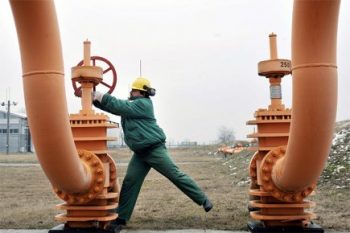
December 20, 2008 • Analysis •
Although Russia’s market share of EU’s gas imports has been halved since 1980, the EU’s gas dependency on Russia should not be underestimated. Commenting on Pierre Noël’s paper “Beyond Dependency: How to deal with Russian Gas”, recently published by the European Council on Foreign Relations (available here), Jean-Pierre Shaecken Willemaers points out that security of supply and Russian strategy remain major concerns in dealing with Russian Gas.
Russia is and will remain a major gas supplier to Europe. However, underrating EU’s dependency on Russian gas to justify more gas imports from Russia is not a rational approach. That is exactly what Pierre Noël did in producing two misleading figures:
“Russia accounts for 6.5% of the EU’s total primary energy supply” and “Russia’s market share of EU’s gas import has been halved since 1980, from 75% to just over 40%”.
Primary energy supply is not the right basis for assessing EU’s dependency on Russian gas. Regional and sector related references would better reflect the reality. Playing with averages and abstract figures does not give a hint of the concrete problems.
For example, more than one third of Germany’s, Europe’s leading economy, annual gas requirements is currently covered by imports from Russia, one quarter from Norway and one fifth from the Netherlands.
The power sector is another example. According to the International Energy Agency, the share of natural gas in EU’s electricity generation will be 34% by 2020 and Mr Medvedev said in November 2007 at a seminar in Rome “meeting the world’s energy needs in the 21st century” that the share of Gazprom on the markets of Europe will be up to 33% by 2015, the vast majority of the exports taking place under long term contracts which run up to 35 years mostly concluded on the basis of intergovernmental agreements.
Moreover there are two main concerns about Russian gas:
- Security of supply;
- Russian strategy.
- maintenance of their gas pipe networks;
- investments in new pipes and exploration/extraction;
- domestic consumption;
- export to Asian countries.
Poor infrastructure maintenance and insufficient investments in new pipes and gas fields are a cause for concern for the future security of supply of Russian gas. On the other hand, the soaring domestic consumption driven by economic expansion and a gas intensive electricity mix and growing exports to Asian countries are increasing the uncertainty of availability of Russian gas for the European market.
Another concern is the Russian strategy of controlling the complete supply chain from gas extraction to the end consumers of the countries where they are doing business.
Gazprom is aiming at:
- Supplying gas directly to European countries avoiding political and economical risks related to gas transit via third countries. The Nord Stream pipeline in which Gazprom holds 51% of the shares is a good example of this policy;
- Developing business in trading natural gas;
- Linking gas supply contracts to the opportunity of operating on the local end-user market;
- Opposing unbundling under which gas pipelines in the EU could not be owned or controlled by companies which supply the gas;
- Seeking a broader access to u/g gas storage in the European countries. For instance Gazprom Export, Austria’s RAG and Wingas started operating the first phase of the Haidag u/g gas storage facility in Austria, in May 2007, with 1.2 bcm operating capacity, the final capacity being 4.3 bcm.
Diversification of gas supply and competitive prices are essential.
